
Many Detroit residents still angry with Romney’s anti-bailout stance
11/2/2012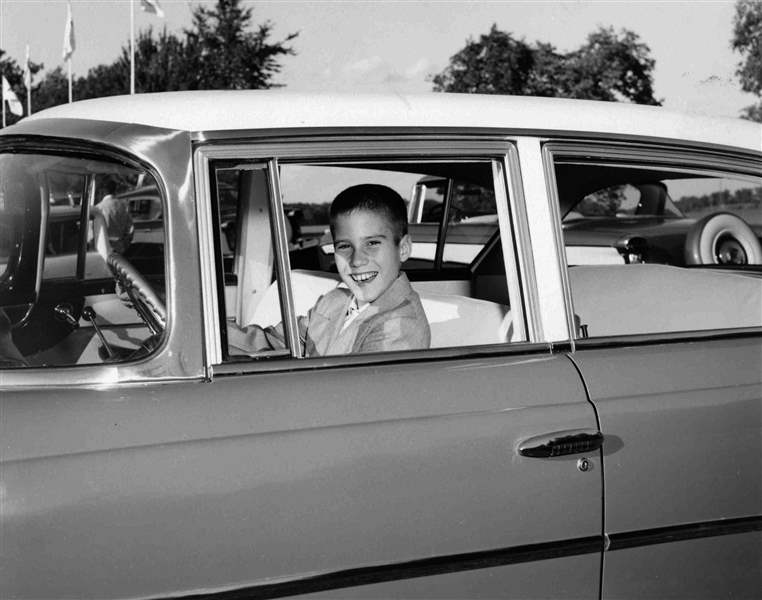
This 1957 photo shows 10-year-old Mitt Romney in Detroit behind the wheel of a Nash automobile, manufactured by American Motors Corp.
ASSOCIATED PRESS
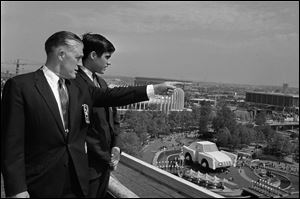
Long before Mitt Romney became the millionaire candidate from Massachusetts, he was his father' son, who idolized the outspoken, no-nonsense, auto executive turned politician.
DETROIT — Ralph Rinaldi was “very much” disappointed by Mitt Romney’s lack of empathy for the Detroit automakers in their time of crisis.
“It was a big mistake, a very big mistake,” said Mr. Rinaldi, 67, a Detroit resident since 1973 and a retired community college professor. “His father would have never done that. His father had lots of ties with the automotive world.”
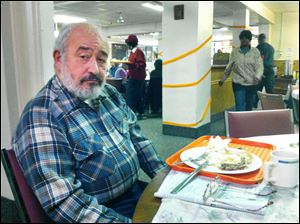
Ralph Rinaldi, 67, a retired community college professor, said he was "very much disappointed" in Mitt Romney's statement that the government should have "let Detroit go bankrupt."
Mr. Rinaldi, who was eating lunch Thursday at the St. Patrick Senior Center near Detroit's rough-and-tumble Cass Corridor, called Mr. Romney “poorly informed,” which his dining mate Robert “Cadillac Bob” McDuffie agreed with.
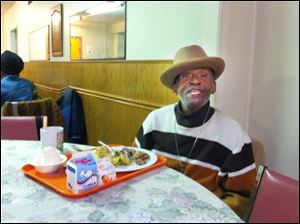
Robert 'Cadillac Bob' McDuffie, 91, a former General Motors employee, said Mitt Romney couldn't relate to the middle class since he was born into wealth.
“He was born rich,” Mr. McDuffie, 91, said of Mitt Romney. “He doesn’t know what it’s like to be middle class, much less poor.”
Mr. McDuffie, who worked for General Motors for 23 years, said he was “very angry” when he heard that Mr. Romney was not in favor of the government helping the automakers back on their feet.

James Cole, 73, a lifelong Detroiter, called Mitt Romney's attitude to the auto industry 'callous.' He said George Romney would have been sympathetic
James Cole, Jr., 73, called Mr. Romney’s attitude toward the auto industry “callous.”
The lifelong Detroit resident, who is a retired mechanic, said Mitt Romney’s father, George, would not have made the same statement. George Romney was “uniquely honest for a Republican. He had a social conscience. Mitt is nothing like his father,” Mr. Cole said.
The city where Mitt Romney has deep roots and the cars it builds should be a source of strength in his bid to be elected president, but instead the U.S. auto industry and its survival many credit to President Obama now looms as a singular challenge to Mr. Romney’s path to the White House.
Despite his father George Romney’s strong ties to the auto industry as chairman and chief executive officer of American Motors, which he helped return to profitability in the 1950s by avoiding bankruptcy, Mitt Romney opposed the federal bailout of General Motors and Chrysler four years ago — a decision that has become an issue that won’t go away in his campaign in battleground Ohio, where 850,000 jobs are tied to making cars.
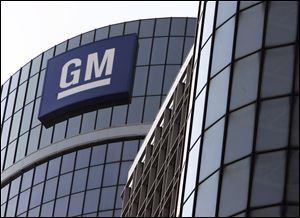
In a 2008 New York Times op-ed piece, Mitt Romney advocated letting the automakers go bankrupt.
In a 2008 op-ed article that the New York Times headlined “Let Detroit Go Bankrupt,” Mitt Romney warned that with a federal bailout, “you can kiss the American automotive industry goodbye.”
The Bush and Obama administrations didn’t take that advice, providing federal assistance of almost $80 billion to save auto giants General Motors and Chrysler, a move credited with helping the two companies survive managed bankruptcies, saving the U.S. auto industry and millions of American jobs — hundreds of thousands of them in Ohio and other Midwest swing states.
Despite the published commentary to the contrary, in recent months Mr. Romney has reversed course on the campaign trail, attempting to take credit for the bailout that he initially rejected. That about-face remains a sore point among some voters in the Detroit metro area.
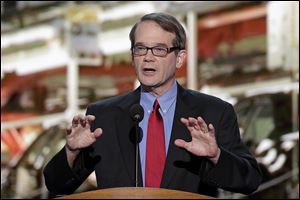
Bob King, president of the United Auto Workers, questions Mitt Romney's honesty for 'changing his story' about the bailout of Chrysler and General Motors.
United Auto Workers President Bob King told The Blade Monday that even though Mr. Romney is a native son, his upbringing in the posh suburbs and at private schools shielded him from knowing what life is really like for the average working people of Detroit.
“While he was from Michigan, he was from a lot of wealth,” Mr. King said. “I just don’t think he relates to working people. That’s why he doesn’t understand the auto industry and how important it is for working families, especially in Michigan and Ohio and Pennsylvania, especially in the heartland, the Midwest. I think people in Michigan don’t feel like he really relates to them.”
Mr. King said he questions Mr. Romney’s “honesty and integrity” because he has “changed his story” about the auto bailout, first saying he was against it, and now backpedaling from that stance.
“People make mistakes,” Mr. King said. “If he just said, ‘I was wrong.’ ”
Dan Piepszowski, senior director, community leadership development, at the Detroit Regional Chamber of Commerce, is a self-described pro-life Catholic Democrat who lives in Detroit. Although his employer has not taken a stance on the national election, he said he would have likely voted for Mr. Romney if he had not distanced himself from the decisions he made while he was Massachusetts governor.
Mr. Romney’s stance on whether the government should have helped the auto industry didn’t help Mr. Piepszowski’s opinion of him. Mr. Romney’s “wait and see” approach to helping the automakers would have been disastrous, he said.
“If we hit a crisis like that again, I think that the Obama Administration is not going to hesitate to understand the gravity of the situation and to say, ‘We have to be there,’ ” Mr. Piepszowski said. “I don’t see Romney necessarily in that position.”

This 1957 photo shows 10-year-old Mitt Romney in Detroit behind the wheel of a Nash automobile, manufactured by American Motors Corp.
Mr. Romney’s connections to Michigan, having grown up in the state with a father who was governor, have no influence on Mr. Piepszowski, he said.
“His being from Michigan, I don’t think it tracks,” he said. “I don’t perceive him as being a Midwesterner.”
When asked to respond to those in Detroit upset by Mitt Romney’s stance on the bailout of General Motors and Chrysler, his campaign issued a statement to The Blade:
“The question for voters is this: who on January 21 is best prepared and most committed to making the American auto industry a dominant force in the world’s economy? As a Michigan native and the son of a car guy, Mitt Romney has always believed that a strong auto industry is an essential component of the nation’s economy.
“President Obama’s hostility to job creators has led him to believe that he can make investment decisions better than the private sector can. So he has told Detroit what kind of cars to build, implemented extraordinarily onerous regulations that will drive up the cost of each car by thousands of dollars, and to this day owns more than one-quarter of General Motors. Mitt Romney will get the federal government out of the auto industry and eliminate regulations that distort the market and drive up costs.”
Frank Benenati, regional press secretary for the Obama for America campaign, countered that Mr. Romney’s auto plan is a too-little, too-late attempt to win over voters.
“Mitt Romney claiming he has a plan for the auto industry is laughable. He turned his back on the industry, its workers, and the people of Ohio when he said it should just go bankrupt — along with the one million jobs tied to it. Mitt Romney trying to convince people now that he is a car guy when he was so willing to let the entire American auto industry go under is an insult to Ohioans. This type of political spin is a desperate act from a desperate campaign, and nothing more,” Mr. Benenati said.
Local GOP support
Mitt Romney was born at Harper Hospital in Detroit in 1947 and lived in the city until his family moved to suburban Bloomfield Hills in 1953.
It was there that he met his future wife, Ann Davies, while attending the exclusive and private Cranbrook School, from which he graduated in 1965. He saw his father elected governor of Michigan in 1962 and re-elected in 1964, 1966, and 1968, before resigning in 1969 to join President Richard Nixon’s Cabinet as secretary of the U.S. Department of Housing and Urban Development. Mitt Romney also helped his mother, Lenore Romney, campaign unsuccessfully for a Michigan U.S. Senate seat in 1970.
Oakland County Executive L. Brooks Patterson, a major figure in Michigan Republican politics for four decades, knew Mitt Romney’s father when he was governor. Their relationship continued after George Romney’s retirement, when the former governor started a program of volunteerism. He was also a steady shopper at Oakland County’s farmers’ market, Mr. Patterson recalled.
Mr. Patterson said he expects Mitt Romney to win Michigan, despite the polls.
“My prediction still stands. So let me stand now and take a bow for my prescience,” Mr. Patterson said.
He acknowledged the state’s economy has been hit hard by the problems the auto industry has faced, but does not think it will affect Mr. Romney’s chances.
“Obviously the domestic auto industry has gone through a hellacious restructuring, including some bankruptcies,” he said. “Thousands of jobs have been lost right here in Michigan and Oakland County. Michigan Republicans have a great deal of confidence in Romney’s business acumen.
“If he recommends a course of action, it is worth considering. The President’s program for the auto industry plagiarized the highlights of Romney’s approach.”

Bob Lutz, a former GM vice chairman, reversed his earlier criticism of Mitt Romney and now supports the GOP candidate.
Bob Lutz, a Republican and the former vice chairman of General Motors, reversed his earlier opinion of Mr. Romney, saying in June that he backed him after criticizing him in February for his lack of support for the auto industry.
“He thinks we didn’t try to borrow money from the banks,” Mr. Lutz said during a February event at the University of Michigan’s Ross school of business. “The banks were even more broke than we were. Who had the money?”
But in June on CNBC’s The Kudlow Report, Mr. Lutz said he had changed his mind.
“You know, all is forgiven. It depends who his opponent is,” he said. “I think he has since modified his stand on that completely. He now says he was totally in favor of [the auto bailout] and suggested it. That’s neither here nor there.”
Mr. Lutz recently told The Blade he continues to “strongly” support Mr. Romney.
“We all make mistakes, and his was that he made comments about a situation he did not fully understand. We all do that,” Mr. Lutz said. “But he is a hugely successful, yet compassionate businessman, organizer, leader, and former governor. His integrity and morality are above reproach. He has conviction, power, and the will to act. There’s no pretense: What you see is what you get.
“He is the president we all need after four years of stasis, rising debt, and declining respect for America abroad.”
Detroit’s divide
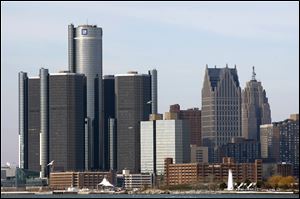
Mitt Romney was born in Detroit and attended an exclusive private school. His family moved to the suburbs in the 1950s.
The rift between Detroit and its suburbs was under way while Mr. Romney attended prep school in the 1960s in affluent Bloomfield Hills. At overwhelmingly white Cranbrook, Mr. Romney belonged to 11 school organizations and school clubs, including the Blue Key Club, a booster group he started. Meanwhile, racial tensions loomed in the city of Detroit, culminating in the deadly race riots of 1967.
Detroit already was facing racial and economic troubles during Mr. Romney’s youth, said Detroit historian Michael Hauser, the author of several books on the subject and a longtime city resident.
“Downtown started to lose its luster in the early 1950s, shortly after Detroit’s population peaked at almost 2 million,” Mr. Hauser said. “The area around Campus Martius, for years the centerpiece of Detroit’s retail and theater district, began to experience office and retail vacancies. Petty crime became more prevalent and traditional retailers were replaced with low-end retailing, and the movie houses reverted to showing exploitation films and presenting burlesque programming.”
A real blow to downtown occurred on Christmas Eve, 1959, with the closure of the Ernst Kern Department Store on Campus Martius, Mr. Hauser said. The 12-story edifice had been a family-owned retailer since the turn of the century.
“Downtown and Detroit in general struggled with change in the 1960s, from the racial makeup of the city to disappearing jobs,” Mr. Hauser said. “The civil disturbance of 1967 was the nail in the coffin in terms of accelerated white flight from residential areas and business from formerly strong districts such as Grand River/Greenfield, Grand River/Oakman, Gratiot/Van Dyke, Gratiot/Seven Mile, Woodward/Six Mile, and Woodward/Manchester.”
Active suburban development and migration of population from Detroit to the suburbs began as early as the 1920s, said William Colburn, a Detroit historian and former executive director of Preservation Wayne. It accelerated after World War II with the construction of the interstate freeways, veterans housing subsidies, and urban renewal policies, as well as increased movement of blacks from the South to Detroit for jobs in the defense plants and the booming economy that followed.
“I would say that the Romneys were in the early-middle of the wave of white flight in 1953,” Mr. Colburn said. “But I believe at that time they were already living in Palmer Woods, the most wealthy neighborhood in Detroit that itself is situated on the edge of the city.
President Obama, based on polls, is expected to win Michigan, which has 16 electoral votes, with Real Clear Politics currently giving him a 4-point average lead over Mr. Romney.
The latest EPIC-MRA poll gives President Obama a 6-point advantage over Mr. Romney, while Rasmussen Reports gives the President a 7-point advantage and LE&A/Denno Research gives President Obama a 3-point advantage.
Even though Mr. Romney is behind President Obama in the polls, he’s come a long way since the Michigan primary election. Of the 11,894 people who cast Republican ballots in Detroit in the presidential primary election Feb. 28, Mr. Romney came in a distant third, garnering 1,344 votes compared to Ron Paul’s 5,538 and Rick Santorum’s 4,051.
Meanwhile, 33,013 Detroit residents voted for President Obama.
Contact Tanya Irwin at: tirwin@theblade.com, or 419-724-6066.